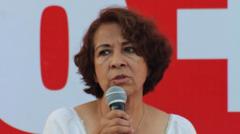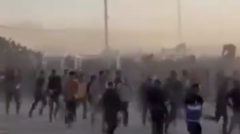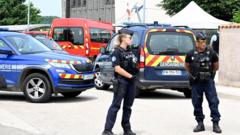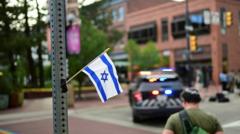The UK government has launched sanctions against Daniella Weiss, a major figure in the Israeli settler movement, signalling its commitment to addressing ongoing violence and urging for action towards peaceful solutions in the region.
UK Imposes Sanctions on Daniella Weiss, Key Figure in Israel's Settler Movement

UK Imposes Sanctions on Daniella Weiss, Key Figure in Israel's Settler Movement
The UK government has taken decisive action by sanctioning Daniella Weiss, known as the "godmother" of Israel's settler movement, in response to escalating violence against Palestinian communities.
The United Kingdom has recently implemented sanctions targeting Daniella Weiss, a prominent far-right Israeli settler dubbed the "godmother" of the settler movement. Foreign Secretary David Lammy articulated that this action reflects the UK’s resolve to hold extremist settlers accountable as Palestinian communities face increasing violence and intimidation. At 79, Weiss leads a radical settler organization called Nachala, which has also been included in the sanctions list.
For many decades, Weiss has played an instrumental role in establishing Jewish settlements within the Israeli-occupied West Bank and East Jerusalem, territories seized by Israel during the 1967 Middle East conflict. The sanctions document highlights her involvement in "threatening, perpetrating, promoting and supporting acts of aggression and violence against Palestinian individuals."
An official from the Israeli foreign ministry described the UK’s sanctions as “unjustified” and “regrettable.” Weiss gained further media attention through her appearance in Louis Theroux’s documentary, "The Settlers." She continues to advocate for rebuilding settlements in Gaza, controversially stating in a past interview, "Gaza Arabs will not stay in the Gaza Strip. Who will stay? Jews." Weiss added that the world could accommodate displaced Palestinians, promoting what she called enabling rather than forcing their relocation.
Following the sanctions, she boasted that numerous families were poised to initiate settlement in Gaza promptly. Nachala has called for actions aimed at "conquest, immigration, and settlement in Gaza," insisting that Israel should persist in military efforts until its adversaries are defeated.
The UK’s sanctions further extend to two additional settlers, Zohar Sabah and Harel David Libi, alongside settlements not officially authorized by Israel. Lammy emphasized that the Israeli government must intervene and cease these aggressive actions that threaten both Palestinian communities and the viability of a two-state solution.
In conjunction with the sanctions, the UK government has paused free trade negotiations with Israel, determining that advancing discussions is not feasible while the Netanyahu administration pursues its controversial policies in the West Bank and Gaza. An Israeli foreign ministry spokesperson retorted that if the British government’s stance was due to its fixation on anti-Israel sentiment and domestic political motivations, it reflected poorly on their economic interests.
The sanctions and subsequent actions by the UK follow a strong statement from the leaders of the UK, France, and Canada, urging Israel to halt its military operations and immediately allow humanitarian aid into Gaza. Although Israel has agreed to permit a minimal food supply into Gaza, United Nations aid chief Tom Fletcher remarked that it represents merely a fraction of the support urgently needed.
In light of these developments, the ongoing conflict and humanitarian crisis in the region remain critically pressing issues as the international community watches closely.





















